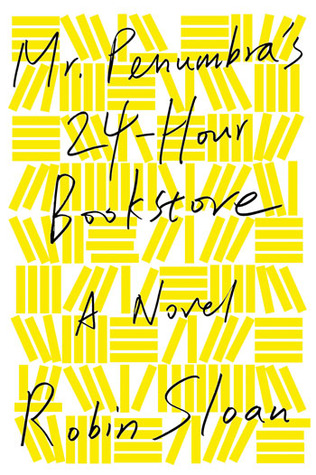I had a very different idea of what this book would be about before I started reading... but even though the subject matter was so wildly different, I still enjoyed this adventure into the similarities between publication and immortality...
As Clay faces his grim future in the unemployment line - thanks to the collapse of the bagel company he served as designer for before the Great Recession - he chances upon a small bookstore, looked over by the enigmatic owner Mr. Penumbra. Frequented by a select clientele who don't even buy the books that populate the store's high-reaching shelves - just check out a copy or two of mysterious coded texts - the bookstore holds a series of secrets Clay can't help but try to uncover... with a little help from Google. (The novel takes place, after all, in San Francisco.)
If you were a little bit taken aback from the inclusion of technology in that blurb, then you're in good company. That was actually the thing that surprised me the most about this novel: the heavy integration of computer-y bits, from the basics of data visualization, to project outplacement through a steady stream of supercomputers, makes for a bit of difference from what I thought I was getting into from just the cover alone. When you look at the sunny yellow psuedo-bookshelves and chicken-scratch writing, you would think it would be something like a Carlos Ruiz Zafon Shadow of the Wind kind of situation, or even a Cornelia Funke kind of Inkheart, but while the books share similar tone - preaching the prolonged endurance of the printed word - they really couldn't differ more in subject.
One attitude taken by the novel I did appreciate, wa the projected ingenuity and optimism represented in the future of Generation Whatever... instead of focusing on the romantic nostalgia of the musty smell of books and the magic contained between moldering pages, there was a Tomorrowland-style appreciation for all the ways technology makes our future even that much more interesting. There was a twin respect for the wonder of books and the wonder of human development, basically unheard of in books about books...
In terms of writing construction, the interior, more personal, form of narration was an incredibly interesting stylistic choice, as well. Instead of a standard format for dialogue, Clay's questions are built into the inner narration, which makes for a wonderfully absorbing character, which makes the job of connecting to him that much easier. You know you're following the story along with Clay, because you're finding everything out at the same time he is.
One thing, though, is that I feel like the inventive plot and format kind of rendered some of the characters a little bit more one-dimensional - from the imposing, mustachio-ed baddie, the fluttery and kind old bookstore owner/mentor, and the geeky and utterly irresistible intelli-girl love interest (see SNL's recent form of parody, One-Dimensional Female Character from a Male-Driven Comedy, for a more complete diagnosis of this particular stock character) - and the happy ending was just a bit too idllyic.
(Then again, an idyllic, tech-driven future, built on youth and ingenuity, that manages to satisfy all consumer groups, is kind of Google's thing, isn't it?)
In the end, I'm just waiting for it all to be unearthed as a conspiracy, planned on the part of Google's PR department, on how to promote a more positive public image for the company in the wake of so many evil-tech-empire scandals in recent years (this year's Christmas miracle will hopefully involve me convincing my father he shouldn't be buying so completely into all of Amazon's splendor).
Final Verdict: Mr. Penumbra's 24-Hour Book Club was actually a fun and interesting quick read, especially recommended for those studying communications or invested in conversations about the durability of the written word.


No comments:
Post a Comment